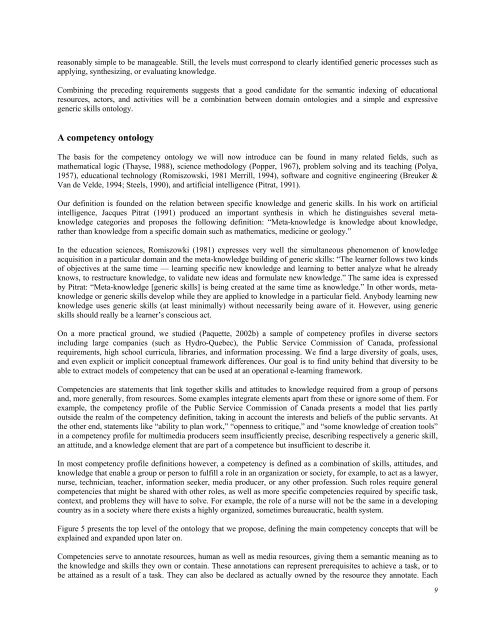July 2007 Volume 10 Number 3 - Educational Technology & Society
July 2007 Volume 10 Number 3 - Educational Technology & Society
July 2007 Volume 10 Number 3 - Educational Technology & Society
You also want an ePaper? Increase the reach of your titles
YUMPU automatically turns print PDFs into web optimized ePapers that Google loves.
easonably simple to be manageable. Still, the levels must correspond to clearly identified generic processes such as<br />
applying, synthesizing, or evaluating knowledge.<br />
Combining the preceding requirements suggests that a good candidate for the semantic indexing of educational<br />
resources, actors, and activities will be a combination between domain ontologies and a simple and expressive<br />
generic skills ontology.<br />
A competency ontology<br />
The basis for the competency ontology we will now introduce can be found in many related fields, such as<br />
mathematical logic (Thayse, 1988), science methodology (Popper, 1967), problem solving and its teaching (Polya,<br />
1957), educational technology (Romiszowski, 1981 Merrill, 1994), software and cognitive engineering (Breuker &<br />
Van de Velde, 1994; Steels, 1990), and artificial intelligence (Pitrat, 1991).<br />
Our definition is founded on the relation between specific knowledge and generic skills. In his work on artificial<br />
intelligence, Jacques Pitrat (1991) produced an important synthesis in which he distinguishes several metaknowledge<br />
categories and proposes the following definition: “Meta-knowledge is knowledge about knowledge,<br />
rather than knowledge from a specific domain such as mathematics, medicine or geology.”<br />
In the education sciences, Romiszowki (1981) expresses very well the simultaneous phenomenon of knowledge<br />
acquisition in a particular domain and the meta-knowledge building of generic skills: “The learner follows two kinds<br />
of objectives at the same time — learning specific new knowledge and learning to better analyze what he already<br />
knows, to restructure knowledge, to validate new ideas and formulate new knowledge.” The same idea is expressed<br />
by Pitrat: “Meta-knowledge [generic skills] is being created at the same time as knowledge.” In other words, metaknowledge<br />
or generic skills develop while they are applied to knowledge in a particular field. Anybody learning new<br />
knowledge uses generic skills (at least minimally) without necessarily being aware of it. However, using generic<br />
skills should really be a learner’s conscious act.<br />
On a more practical ground, we studied (Paquette, 2002b) a sample of competency profiles in diverse sectors<br />
including large companies (such as Hydro-Quebec), the Public Service Commission of Canada, professional<br />
requirements, high school curricula, libraries, and information processing. We find a large diversity of goals, uses,<br />
and even explicit or implicit conceptual framework differences. Our goal is to find unity behind that diversity to be<br />
able to extract models of competency that can be used at an operational e-learning framework.<br />
Competencies are statements that link together skills and attitudes to knowledge required from a group of persons<br />
and, more generally, from resources. Some examples integrate elements apart from these or ignore some of them. For<br />
example, the competency profile of the Public Service Commission of Canada presents a model that lies partly<br />
outside the realm of the competency definition, taking in account the interests and beliefs of the public servants. At<br />
the other end, statements like “ability to plan work,” “openness to critique,” and “some knowledge of creation tools”<br />
in a competency profile for multimedia producers seem insufficiently precise, describing respectively a generic skill,<br />
an attitude, and a knowledge element that are part of a competence but insufficient to describe it.<br />
In most competency profile definitions however, a competency is defined as a combination of skills, attitudes, and<br />
knowledge that enable a group or person to fulfill a role in an organization or society, for example, to act as a lawyer,<br />
nurse, technician, teacher, information seeker, media producer, or any other profession. Such roles require general<br />
competencies that might be shared with other roles, as well as more specific competencies required by specific task,<br />
context, and problems they will have to solve. For example, the role of a nurse will not be the same in a developing<br />
country as in a society where there exists a highly organized, sometimes bureaucratic, health system.<br />
Figure 5 presents the top level of the ontology that we propose, defining the main competency concepts that will be<br />
explained and expanded upon later on.<br />
Competencies serve to annotate resources, human as well as media resources, giving them a semantic meaning as to<br />
the knowledge and skills they own or contain. These annotations can represent prerequisites to achieve a task, or to<br />
be attained as a result of a task. They can also be declared as actually owned by the resource they annotate. Each<br />
9

















